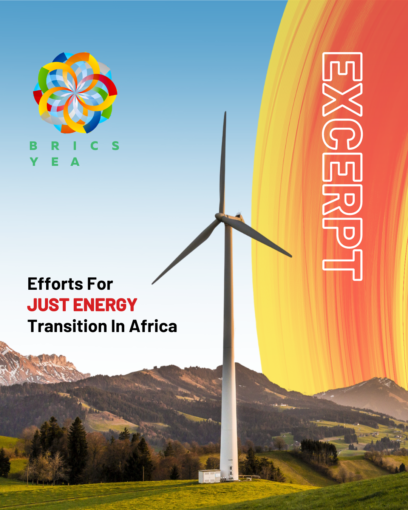28 July 2023
Intergenerational Efforts For A Just Energy Transition In Africa
Intergenerational efforts refer to the collaboration between different generations working collectively to achieve sustainable energy goals.
A UN report by the Department of Economic and Social Affairs shows that youth face a disproportionately higher impact of climate change than the older generations, despite having a significantly low contribution to this change. Thus, policymakers should work with the youth to address energy issues in Africa and around the globe. Just and equitable energy access will strengthen inclusion, reduce inequalities and empower people through modern energy access. An affordable, sustainable energy system will not only help alleviate poverty in Africa but also create many new opportunities. It will also help build climate resilience and minimize vulnerability to climate change in Africa.
A just energy transition in Africa will require careful consideration of the equity implications and challenges associated with energy poverty, low consumption, and increased energy demand for economic growth and transformation. While these issues require a well-purposed strategy and joint efforts of the community, a just energy transition presents immense opportunities that countries should maximize.
African countries with large rural populations without access to electricity have launched national electrification plans to accomplish universal energy access.
Decentralized renewable energy systems will play a fundamental role in meeting household energy needs and in providing electricity to key public institutions, such as healthcare and education facilities. These systems will also help power local needs, including those in remote areas, and contribute to climate change mitigation—low-cost electrification. Moreover, distributed systems can be implemented alongside grid expansion to target remote areas and provide them with renewable energy.
Various international organizations are working in Africa to facilitate just energy transition. The International Renewable Energy Agency (IRENA) has been facilitating cooperation and information sharing among African countries to accelerate the use of renewable energy. Countries like Egypt, Ethiopia, Kenya, Morocco, and South Africa have shown firm commitment towards this goal.
The International Energy Agency (IEA) has been providing analysis and policy advice to African countries on how they can achieve their energy-related development goals while reducing their emissions. The IEA’s Africa Energy Outlook 2022 explores a Sustainable Africa Scenario (SAS) in which Africa achieves universal access to modern energy services by 2030 and the full implementation of all African climate pledges.
The South African government is playing a particularly active role in promoting collaborations between various stakeholders. It has curated a special platform for these discussions called the Integrated Energy Transition Dialogue–Youth Consultation. These dialogues provide the stakeholders with an opportunity to share their perspectives, concerns and ideas for energy transition. This also provides a platform for the inclusion of the younger generation into the policy making process.
Also, the African Development Bank (AfDB) has been supporting various projects and initiatives that aim to create decent jobs and economic opportunities in the renewable energy sector. It has worked towards creating jobs in renewable energy, energy efficiency, manufacturing, transportation, and building and construction of renewable energy plants and facilitating collaborative efforts among different countries of Africa.
The African youth actively engage at national and global levels in awareness-raising, running educational programs, planting trees, promoting renewable energy, providing innovative energy solutions, and adopting energy-saving practices.
The younger generation is focused on exploring alternative sources of energy as hedges against inventory depletion. The African youth even voiced moral concerns about staying in the fossil-fuel industry long-term because of its impact on the environment and climate.
Intergenerational efforts will help address energy issues by ensuring that the energy transition is achieved throughout the continent to support the democratization of energy access. A just energy transition is both a temporal and a spatial challenge, therefore all the generations will have to come together and contribute to an equitable and just transition.
One of the major challenges in all these efforts is that the present leaders and policymakers need a fresh perspective to boost the momentum of this change. Therefore, it becomes essential for youth to come up and join hands with the senior leadership for their shared future. The past several years have proved to be a lesson for all of us, in the complexity and unpredictability of problems that we may face.
The government of South Africa realizes this issue and has launched special mentorship programs for young leaders. These programs strategically pair young leaders with experienced policy professionals who can provide them with guidance and support for their career advancement in renewable energy. These initiatives contribute to intergenerational collaboration by fostering knowledge transfer.
Successfully navigating towards energy transition requires the African population to build adaptability and resilience. Short-term planning is necessary to foster resilience and flexibility as short-term momentum leads towards long-term goals.
Unity is the greatest asset for combating climate change. Together, leaders can combine their strengths to pave a path towards a sustainable future and explore new ways of thinking about energy production and consumption.
Author: Bhavishyata, The Geostrata
Share news


